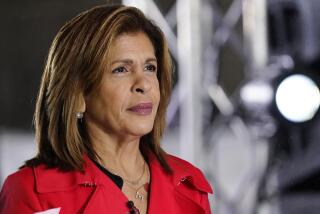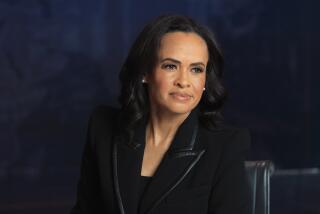Moving past âTodayâ
New York â âIâVE always been a serious person, actually.â
Katie Couric was talking about whatâs been Topic A in media circles this spring: Can she make the transition from the mostly frothy melange that is morning television to the buttoned-down world of network evening news?
The longtime âTodayâ co-anchor made no pains to hide her exasperation with such thinking.
âBlah, blah, blah,â she said. âJohn Chancellorâ -- the NBC morning show host who went on to anchor the nightly news for 12 years -- âdrove a go-cart on the âTodayâ show. Get over yourselves, really. I think itâs sort of a lemming-like reaction and not very informed, because I think if anybody watches the show, theyâll know we do plenty of serious things.â
But she wasnât done: âTo suggest you canât have fun and you canât talk about fashion and enjoy it and then do a serious story on welfare reform is just limited in your thinking.â
Couric, who wraps up her 15-year run on âTodayâ Wednesday, was careful to keep her thinking to herself for the last year as pundits debated the merits of her making the jump to the âCBS Evening News.â But with the decision behind her, the 49-year-old broadcaster is feeling a lot freer to speak her mind.
During a wide-ranging conversation on a recent afternoon, she demonstrated the frank self-assuredness that lies beneath her lighthearted on-air demeanor. Perched on a couch in her publicistâs office, she fielded questions with remarkable candor, unhesitatingly addressing her frustrations with the media, her feelings about her public profile and that whole question of âgravitas.â
âThe notion that you canât wear mascara and a pretty pair of earrings and ask really intelligent, insightful questions at the same time is just so passe,â she said firmly.
Couric is the first to admit that making the decision to walk away from âTodayâ -- her home for the bulk of her professional career -- to take over the third-place evening newscast at another network was not an easy one. But as she prepared to leave NBC, the broadcaster seemed relaxed, even liberated.
âI do have mixed emotions because Iâm going miss everyone I work with so much,â she said. âBut no matter what happens, I feel really confident that Iâve made the right decision.â
Those close to her say that Couric mulled over her choice for several months in long phone conversations with a âkitchen cabinetâ of friends, carefully considering what she wanted at this point in her career.
âIt was a tough decision for her to make, and now that itâs a done deal and happening, I sense a calmness about her that is really nice to see, because I know sheâs in a really good place about it,â said Wendy Walker, a senior executive producer at CNN and a friend of more than 20 years.
Her move to CBS will no doubt be scrutinized more substantially than the last time she changed jobs in April 1991, when the then 34-year-old was named co-anchor of âTodayâ alongside Bryant Gumbel, a morning show veteran.
Couric had been at NBC for just two years -- as the deputy Pentagon correspondent and then âTodayâsâ national correspondent -- but she said she had no hesitation about telling Michael Gartner, then the news division president, that she wanted âa 50-50 split in hard newsâ with Gumbel.
âCan you imagine?â she recalled with a laugh. âThe gall I had. Iâm sure they were probably like, âWho is this person? Where does she come from?â â
Gartner promised her 52-48, and Couric replied, âWell, Iâll take that and Iâll build from there.â
Growing reputation
The young anchor quickly distinguished herself as someone with the right combination of nimbleness and warmth. In an oft-repeated story, Couric cemented her journalistic credentials in the eyes of many critics when she turned a chance encounter with President George H. W. Bush during a tour of the White House into a 19-minute live interview about the Iran-Contra scandal and the impending presidential election.
Under the direction of then-executive producer Jeff Zucker, Couric also brought a new level of intimacy to the program, as she discussed being a young mother of two daughters and then the pain of losing her husband, Jay Monahan, to colon cancer in 1998.
Meanwhile, she and co-anchor Matt Lauer, who replaced Gumbel in 1997, developed a teasing banter that helped keep âTodayâ the most-watched morning show for 10 years running, a partnership Couric said sheâs going to miss.
âWeâve been each otherâs safety nets,â she said.
Couric canât pinpoint a moment when she felt ready to leave âToday.â
âIt was an evolution, really,â she said. âI always would say, âWould it kill me if somebody else was doing this instead of me?â And when my contracts came up, I always thought, âIâm just not ready.â But this last time I was.
âSo it sort of passed the âIâm-not-going-to-die-if-Iâm-not-doing-the-Thanksgiving-Day-parade test,â â she added with a laugh.
The CBS job -- which offered the chance to do long-form pieces for â60 Minutesâ as well as anchoring the evening news -- âjust seemed like a wonderful, if highly public, exciting risk to take.â
When she takes over the anchor desk from Bob Schieffer in early September, Couric will be the first woman to officially helm a network evening newscast alone, a fact she called âa nice bonus,â but not a driving factor in her decision. But thereâs no doubt that her influence on the program will be closely watched, as well as her ability to challenge current NBC colleague Brian Williams, who anchors the No. 1 news broadcast, and ABCâs recently anointed Charles Gibson, and propel the âCBS Evening Newsâ out of last place. A larger challenge: to prove the vitality of the evening news genre after years of declining audiences.
Couric declined to discuss her plans for the newscast, whose focus she is going to develop in meetings with CBS producers throughout the summer, except to say that it will be a reflection of her sensibilities.
âThereâs not going to be like a fun quarantine: âYou canât laugh on the evening news,â â she said. âI think viewers are much smarter than TV executives, in a way, because I donât think anyone wants a one-dimensional person. I think they want authenticity. And authenticity means youâre a multifaceted individual.
âIâm not going to change who I am or how I relate to people or how I tell stories. Because I do some of the lighter stuff and have a sense of humor at time doesnât mean that Iâm not a really serious person, when necessary. So I think it will be a combination of everything that hopefully I have to offer.â
Used to the spotlight
Couric is somewhat resigned to the press of publicity that will accompany her move to the evening, even joking about the endless fascination with her appearance. As she entered the room at the beginning of the interview and took off a sequin-detailed, cropped white coat, she quipped: âNow youâre going to write, âAs she peeled off her white, sequined jacket ... â â
It took her a while to get used to the scrutiny that comes along with being one of the best-known broadcasters in the country, she admitted.
âI used to be very hypersensitive when I first started, when people wrote things that werenât nice about me,â she said. âI could probably quote back to you articles that were written when I started. They were few and far between -- I was really lucky -- and I was treated very well. But I remember when someone wrote that I had chipmunk cheeks. Or that I didnât do the right follow-up question for a book that had been written about Cuba. You would have thought that it was the end of the world.â
Nowadays, she said she tries to take the attention in stride. But after living through a year of public speculation about her next career move and endless dissection of her skills as a journalist, Couric is somewhat impatient with her media kin.
âThere are a lot of lazy reporters out there and I think they rely on Google and donât necessarily do their own thinking,â she said.
While noting that there are âa lot of great reporters,â Couric added: âI read things with a much more jaundiced eye than I used to because I, from personal experience, have been made aware of the panoply of inaccuracies that go unchecked and unchallenged every day.â
Itâs an experience that sheâs keeping in mind as she prepares to take up the mantle of a network evening newscaster.
âI think itâs made me realize that jumping on the bandwagon is not always the way to go, and itâs our responsibility as journalists to take a step back and not necessarily be swept up with not only the story, but the tenor of the story,â she said. âIâve learned that itâs really important to say, âWait a second, is this really right, just because it appears here, here and here? Or is there a better way of doing this story, and is there a different perspective?â To me thatâs really responsible journalism -- not following the pack.â


